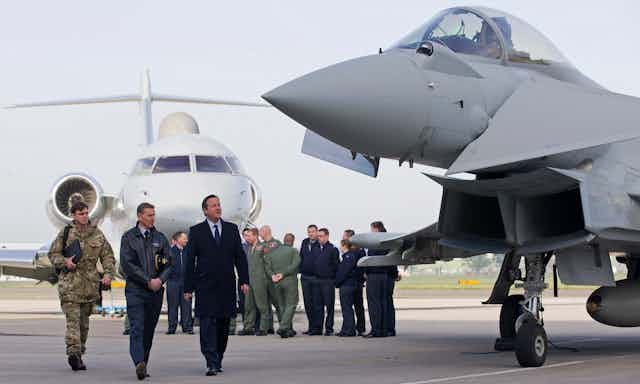British prime minister, David Cameron, has released a motion for the House of Commons which will vote on whether to join the bombing campaign against Islamic State in Syria on the grounds that it “poses a direct threat to the United Kingdom”.
The terror attacks on Paris have provided an emotional justification for deeper military intervention in Syria, but on just about every other basis for argument the situation cries out for caution, prudence and reflection rather than more extensive military engagement. The Middle East has already suffered 14 years of military intervention with few positives to show for it. The challenge facing us, now, is how to develop creative, plausible and non-violent alternatives to the current cycle of violence.
The critical and under-explored questions about a new intervention in Syria are: is it justified? Will it work to weaken Islamic State? And what are the likely consequences for both Syria and the UK when the bombing stops? Past answers to these questions ended badly in Afghanistan, Iraq (twice) and Libya. We should reflect before making the same mistakes in Syria.
The rationale for bombing is unclear on several grounds: David Cameron’s case for bombing as set out in the Commons motion is based on shared values and alliance solidarity, rather than evidence that expanded bombing will remove the threat from IS. He has not managed to establish any causal connection between expanded bombing and how this would weaken ISIS or make Syria more stable.
If the primary justification for expanded bombing is enhancing the security of British citizens, then this connection has not been made either. A US marine commander, Lieutenant General Robert Neller, offering his best assessment of how the war is going, described it as “a stalemate”.

Despite what the motion says about there being a “clear legal basis to defend the UK and our allies in accordance with the UN Charter”, there is no compelling legal authority for bombing. Security Council resolution 2249 does not give any state a licence to declare war. The resolution asks members to “take all necessary measures to prevent and suppress terrorist acts committed specifically by ISIS and to eradicate the safe haven they have established over significant parts of Iraq and Syria”. It also speaks of being determined to combat Islamic State by “all means”.
The resolution did not, however, invoke Chapter VII of the Charter, which specifically sanctions military action. It was also not a formal decision of the Security Council rather a request for action from states. To act as though it were a Chapter VII resolution further erodes the integrity of the council and the charter.
There is no historical reason for thinking that deeper military engagement –especially deeper aerial bombing – will end any more happily than any Western intervention since the first Gulf War in 1991. These interventions have arguably made bad situations worse. They have not degraded the capacity of regimes or militias in the Middle East to wage war on citizens and neighbours nor generated better regimes than those they toppled and replaced.
There is no evidence to support the claim that 70,000 moderate Syrian militia remain ready and poised to overthrow both ISIS and Assad and develop a regime capable of restoring peace and stability to Syria and the region. Very little attention has been given to any post-war reconstruction strategy and – on the basis of past experience – the West has proven woefully inadequate on these issues.
Islamic State is a violent group and its methods are deadly and horrific. To respond to its violence with violence, however, is to cede the ethical high ground and exclude nonviolent possibilities.
Hitting dandelions
It has been said that trying to stop terrorism with air strikes is like trying to stop a seeding dandelion by hitting it with a golf club. Bombing Syrian towns is likely to increase Islamic State recruitment both in the Middle East and in Europe. This is why IS encourages terror attacks in Western cities and why al-Qaeda welcomed Soviet and US attacks on Afghanistan. Responding to terrorism with air strikes justifies the ISIS narrative that they are engaged in a holy war with the West and arguably creates the very radicalisation it purports to be fighting.

Based on the evidence of the Global Terrorism Index Report 2015, we judge that the “War on Terror” is likely to have increased terrorism to date. The growth of jihadism and the incidence of terrorist attacks in Afghanistan and Iraq increased significantly following the military interventions in those countries. The great majority of these have taken place in just five countries where the “War on Terror” has been concentrated: Afghanistan, Iraq, Syria, Pakistan and Nigeria. Terrorism and the war on terror are locked into one another, each fuelling an escalating cycle of violence and conflict.
Options to explore
There are alternative courses of action available. The conditions which allowed IS to breed are the civil wars in Syria and Iraq. The top priority, as Syrians themselves say, is to stop the war. In the short term, the need is for a UN-mandated ceasefire. Over the longer term, the need is to continue and intensify the search for a political settlement, to end the outside supply of weapons and finance which fuel the war, to wind down outside military interventions and move towards disarming and demobilising the forces inside Syria.
In the immediate future, we urge a pause rather than adopting an irreversible course, which is likely to kill and maim more innocent people in Syria, to fuel terrorism, and to have further damaging effects in the Middle East and the world. We need more creative and imaginative solutions to the problems we are confronting than those currently on the table.

